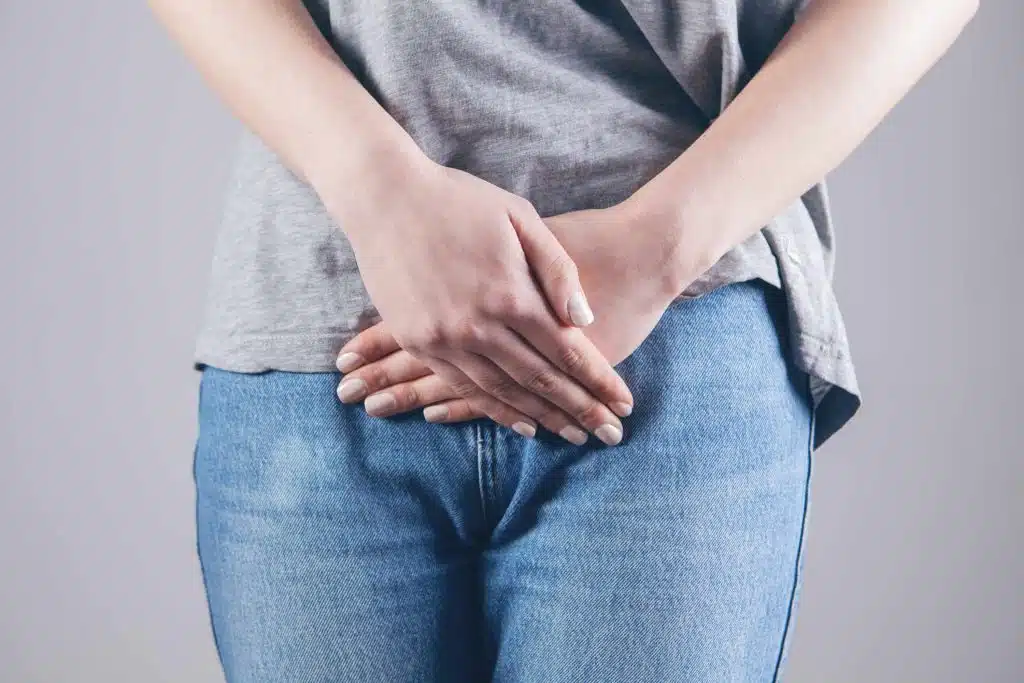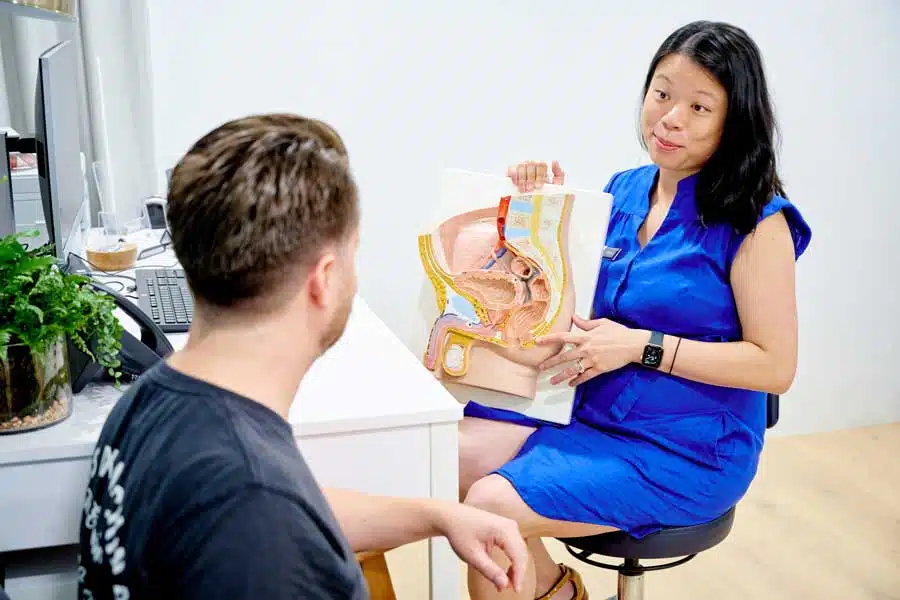Though endometriosis is a condition that impacts a large population of women in Australia (1 in 9 women in Australia will be affected), it’s still one that very little is known about. That’s why for Endo Awareness Month, we’re ready to change the narrative and help more people understand what exactly Endometriosis is.
The team at Sydney Pelvic Clinic is closely connected to the research teams leading the way in the world of endometriosis research. We’re fully committed to not only better understanding endometriosis but ensuring we deliver the highest quality care we can to our patients living with it.
In this guide, we’re going to break down everything you need to know about endometriosis, including what it is and ways you can support those living with it. Let’s get started!
What Is Endometriosis?
Endometriosis is a condition where the tissue similar to the interior lining of the uterus grows on the outside of the uterus. This tissue growth can also happen on other organs in the pelvic region, such as the bladder, ovaries and bowel, as well as other areas in the body.
What are the Symptoms of Endometriosis?
While symptoms for endometriosis vary from patient to patient, the following are the most common:
- Painful menstrual cycles
- Excessive/heavy bleeding during menstruation
- Prolonged menstruation cycles
- Pain while emptying the bowel and/or bladder
- Pain during sex
- Pain in the pelvic region, back, or lower belly
- Fatigue
- Fertility issues (difficulty becoming pregnant)
- Irregular menstrual cycle
How is Endometriosis Diagnosed?
Diagnosis for endometriosis usually begins with a thorough clinic history. To confirm a diagnosis of endometriosis, a laparoscopy examination (keyhole surgery) with a biopsy to confirm endometrial lesions is required. This is performed under general anaesthetic, using a thin telescope to move through the belly button and take a sample. A pathologist can then test it to confirm an endometriosis diagnosis.
How does Endometriosis Impact Women?
There is a lack of awareness around endometriosis, which has a massive impact on those seeking treatment for it. Despite a large population of women dealing with this condition, there is still little known about what causes it, and the best way to treat it. As a result, many women who have endometriosis end up dealing with it alone and/or believe there is no hope for their condition to improve.
It’s more than just the physically painful symptoms. Endometriosis can also massively impact mental health, due to the mental impact of living with painful symptoms, fatigue, and potential struggles with infertility.
Endometriosis is a condition that affects many women throughout the world, and not enough is being done to understand it. A lack of awareness is what continues to allow a lack of research to happen, leaving patients awaiting new treatment options without much hope. A condition like endometriosis that impacts so many deserves the proper funding needed to better understand and treat it.
Endometriosis Movements
Thankfully, there are groups across the globe that are working to combat the lack of awareness for endometriosis. This includes movements like the EndoMarch Global Movement, whose work has gone across the globe, inspiring increased funding for endometriosis research.
The work of groups like EndoMarch is doing wonders to increase awareness, and new research is emerging that can offer hope to patients. Some of these studies include:
- Development of blood test kits for easier endometriosis diagnosis
- Keyhole surgery to treat endometriosis-related infertility
- New medications, like Danazol and Gonadotrophin-releasing hormone analogues to treat endometriosis pain
- Acupuncture for endometriosis pain
- For more research, click here.
Getting Medical Help for Endometriosis
Those looking for help managing their endometriosis should reach out to a healthcare professional such as a gynaecologist or pelvic physiotherapist.
Gynaecologist
As we touched on above, diagnosis of endometriosis will require a laparoscopic procedure, which is conducted by gynaecologists. They are the ones most equipped to diagnose this condition, explain it to patients, and get you on the path to symptom improvement.
Pelvic physiotherapist
A pelvic physiotherapist, such as those at Sydney Pelvic Clinic, can also do wonders to address endometriosis-associated pain (EAP) symptoms. EAP is a condition that sits under the chronic/persistent pelvic pain umbrella and pelvic physiotherapists can do a whole lot to help.
The biggest problem endometriosis patients have is a misunderstanding of the condition, leading to treatment plans that don’t address symptoms. In many cases, endometriosis pain is a kind of pain doctors are tempted to treat medically and surgically. Surgery, however, is not a quick fix. And while surgery can remove excess tissue growth, many walk away from surgery still dealing with the same painful symptoms. This is because there is more to pain than just the disease itself. These factors include pelvic floor and abdominal wall tension, inflammation, sensitivity, stress and other lifestyle factors.
A pelvic physiotherapist can be a great resource for patients looking to take a more multidisciplinary, holistic approach to their condition. Pelvic floor treatments can do wonders to help reduce symptoms, including endometriosis-related pain. After an initial assessment, your physiotherapist can create a program suited to you, helping you achieve your specific treatment goals.
Helping a Partner who has Endometriosis
If you are the partner of someone who has endometriosis, there are different things you can do to help them cope with the condition. We suggest trying the following:
Talk About Feelings
The most important thing you can do is increase communication. It is important to talk with your partner openly about the condition, how it makes both of you feel, and the ways it impacts your relationship.
When having these conversations, it’s best to be honest without placing any feelings of guilt or blame. It’s important to acknowledge the impact it has on both people in the relationship.
Be Gentle With Intimacy
You should also consider how you approach intimacy if you have a partner struggling with endometriosis. This condition can impact sex in different ways, including a lowered libido, or pain during sex. Again, you’ll want to open up the communication channels, be honest about intimacy, and maybe find new ways to approach it.
Discuss Family Planning
Endometriosis can impact a person’s fertility, leading to difficulties in conceiving. This can have a negative impact on a person’s mental health, especially when approaching family planning.
When talking about family planning, be honest and supportive. Remember to prioritise your partner’s health, and recognise difficult feelings around an inability to easily have children. You may also want to reach out to healthcare professionals when family planning, to see what your options are.
Talk With a Counsellor
Finally, if you and your partner find you are struggling with an endometriosis diagnosis, you may want to look into counselling. A counsellor can be an amazing resource when dealing with a difficult diagnosis, helping you to navigate feelings in a healthy way.
Receiving Help from Sydney Pelvic Clinic
While there currently is no perfect cure, a combination of medical management, physiotherapy and nutrition is still very promising. By finding out what combination works best for you, you can be in control of your Endo instead of it controlling you! We also have different services available here ready to help you understand your endometriosis-related pain, reducing that pain and, in some cases, help you avoid surgery and medications.
How do we do it? Explore our different offerings below:
Pelvic Pain and Your Brain
The Pelvic Pain and Your Brain event is an online webinar to help you better understand the role of your nervous system in chronic pain conditions like endometriosis. Attend this to learn tips about living with chronic pain, self-management strategies you can use to manage symptoms, and the importance of regulating the nervous system
Pelvic Yoga
Our small group yoga classes are an amazing resource for those looking to get active and try something new to alleviate their symptoms. These small group sessions are suited to beginners looking to focus on improving pelvic health and spine health and calming down the nervous system.
Pelvic Floor Release Program
This workshop is focused on addressing pelvic floor tension and pain, perfect for those looking to alleviate endometriosis-related pain. Using a combination of meditation, yoga, psychology, and physiotherapy practices, this workshop is designed to help you relax the nervous system and reduce pelvic floor tension. Gentle movements, breathing techniques, meditation, and different postures will work to help you get to a healthier place.
Remedial Massage
Remedial massage is a type of massage therapy that works to target specific areas of injury and/or pain. By stimulating blood flow to affected areas, massage therapists can do wonders to address endometriosis pain and reduce symptoms.
General Inquiries
Want to speak to a member of our team? If you’d like to contact the clinic to book a consultation or learn more about the offerings listed above, please click here.

